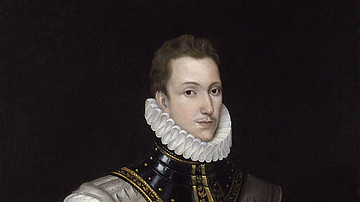Search Definitions
Browse Content (p. 3)

Definition
Russian Revolution of 1905
The Russian Revolution of 1905 challenged the absolute power of Tsar Nicholas II (reign 1894-1917) as ruler of the Russian Empire. Bloody Sunday in 1905 started the year disastrously for the tsar when soldiers fired upon an unarmed crowd...

Definition
Philip Sidney - The Gentleman-Poet of Elizabethan England
Sir Philip Sidney (1554-1586) was an English poet, scholar, soldier, and courtier, one of the most prominent figures at the court of Queen Elizabeth I of England (r. 1558-1603). During his lifetime, he was revered as the ideal Elizabethan...

Definition
Grigori Rasputin
Grigori Rasputin (1869-1916) was a self-styled holy man and faith healer from Siberia who ingratiated himself with the family of Tsar Nicholas II (reign 1894-1917). Rasputin was particularly valued by the empress Alexandra Feodorovna (1872-1918...

Definition
Christopher Marlowe - Poet, Playwright, Spy
Christopher Marlowe (1564-1593), or Kit Marlowe, was a poet and playwright of the English Renaissance who wrote during the Elizabethan Era (1558-1603). His mastery of the blank verse – unrhymed iambic pentameter – transformed the way plays...

Definition
Bloody Sunday in 1905 - The Massacre at the Tsar's Winter Palace
Bloody Sunday on 22 January 1905 was the massacre of peaceful and unarmed protestors by soldiers outside the Winter Palace in St. Petersburg, Russia. The crowd of workers and their families were led by Father Georgy Gapon (1870-1906), who...

Definition
Passmore Williamson - Liberator and Celebrity Prisoner
Passmore Williamson (1822-1895) was a Quaker abolitionist, successful businessman, and member of the Underground Railroad in Philadelphia, Pennsylvania. Williamson helped many slaves gain freedom, among them Henry Box Brown (circa 1815 to...

Definition
Timur - The Brutal Conqueror of Central Asia
Timur (1336-1405), also known as Tamerlane, Temür, or Timur Leng, was the founder of the Timurid Empire (1370-1507), which had its heartlands in modern-day Uzbekistan and capital at Samarkand. A Muslim Turkic chieftain who claimed Mongol...

Definition
U-Boat - Germany's Submarines of WWI & WWII
The U-boat, short for Unterseeboot (undersea boat), was the name for submarines used by the German Navy during the First World War (1914-18) and Second World War (1939-45). In the two Battles of the Atlantic, U-boats sank thousands of ships...

Definition
John Fletcher - Father of the English Tragicomedy
John Fletcher (1579-1625) was a playwright of the English Renaissance who flourished during the Jacobean Era (1603-1625). The author of over 50 plays, he is known for developing the genre of tragicomedy in English literature, and for his...

Definition
Thomas Middleton - Master of Jacobean Comedy and Tragedy
Thomas Middleton (1580-1627) was a poet and playwright of the English Renaissance, who flourished during the Jacobean Era (1603-1625). One of the most successful dramatists of his time, he often collaborated with other playwrights, including...